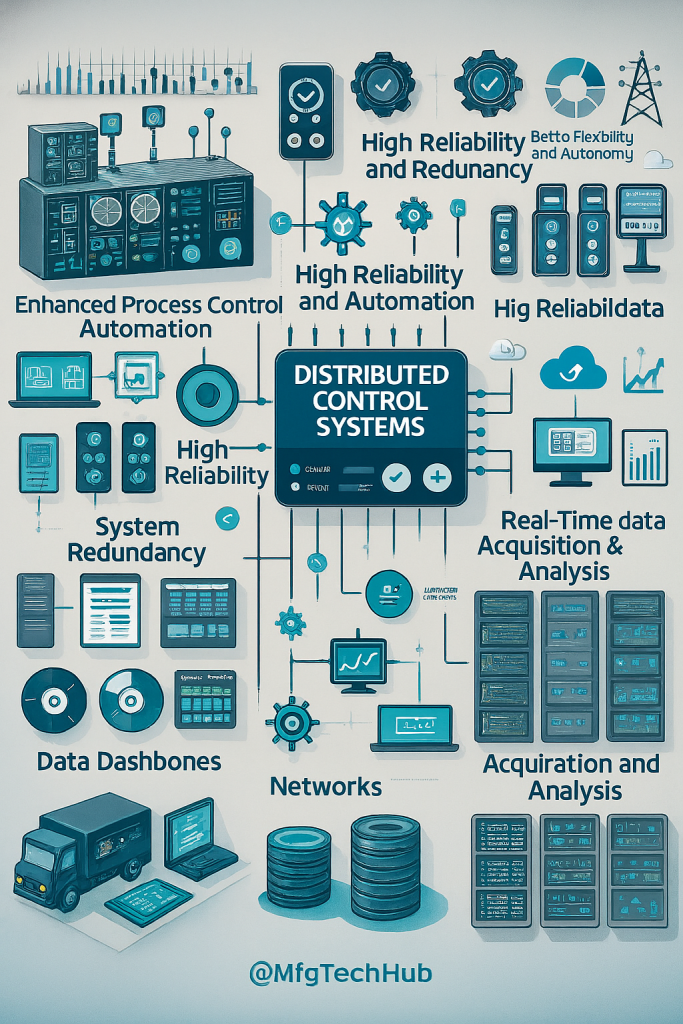DCS System Advantages
Distributed Control Systems (DCS) provide the backbone for many of the world’s most critical industrial processes. From power plants to oil refineries, from water treatment facilities to chemical manufacturing plants, DCS platforms have earned their place as trusted automation frameworks. Their ability to balance process automation with operator oversight ensures safer, more efficient, and more productive operations. The advantages of DCS systems are numerous, but the most significant can be grouped into four categories: Enhanced Process Control and Automation, High Reliability and Redundancy, Scalability and Flexibility, and Real-Time Data Acquisition and Analysis. Understanding each of these areas highlights why DCS remains central to industrial automation strategies worldwide.

Distributed Control Systems: Powering industrial automation with reliability, redundancy, and real-time data insights.
1. Enhanced Process Control and Automation
At the heart of a DCS is its ability to automate complex processes with precision. Instead of relying heavily on manual adjustments and operator experience, the system uses advanced algorithms to maintain process parameters within tightly controlled limits. This level of automation reduces variability, boosts consistency, and minimizes human error. In industries where even small deviations can lead to costly rework or unsafe conditions, such precision is invaluable.
The control capabilities of DCS platforms go far beyond simple on/off instructions. They incorporate sophisticated strategies such as Proportional-Integral-Derivative (PID) control, cascade control loops, and feedforward adjustments. These methods ensure that the system not only reacts to changes but also anticipates them, maintaining stability in dynamic environments.
- Centralized Control: Operators can manage entire plants from integrated consoles.
- Advanced Algorithms: Sophisticated strategies fine-tune processes for optimal outcomes.
- Error Minimization: Continuous monitoring reduces the impact of human mistakes.
Example: In a chemical processing plant, DCS systems automatically regulate reactor temperatures to ensure precise chemical reactions. Instead of manual monitoring, the system adjusts heating or cooling in milliseconds, protecting product quality and safeguarding against runaway reactions.
2. High Reliability and Redundancy
Reliability is perhaps the most prized advantage of a DCS. Industrial processes often run continuously, with downtime measured in thousands of dollars per minute. DCS platforms are engineered with redundancy at multiple levels to ensure that failures in one component do not bring operations to a halt. Backup controllers, dual communication paths, and redundant power supplies all contribute to uninterrupted performance.
This redundancy is paired with fault-tolerant design. Distributed architecture means that even if a controller at one part of the plant fails, other controllers continue to function independently. The system also incorporates automatic failover features, seamlessly switching to backup resources without operator intervention. This design not only maintains uptime but also strengthens safety, since critical processes are less likely to spiral out of control during equipment malfunctions.
- Redundant Components: Multiple backups for controllers, networks, and power.
- Fault Tolerance: Isolates failures to prevent system-wide collapse.
- Automatic Failover: Switches instantly to backups without disruption.
Example: In a power plant, a redundant DCS ensures that boiler operations continue smoothly even if the primary controller malfunctions. Operators may never even notice the switchover, as the failover happens in real time.
3. Scalability and Flexibility
Another key strength of DCS is its modular and scalable architecture. Industrial plants are rarely static—new equipment is added, production capacities expand, and regulatory requirements evolve. A well-designed DCS can grow alongside the facility, accommodating these changes without requiring a complete system overhaul. This flexibility reduces costs and ensures that investments in automation remain relevant for decades.
The modular design means new controllers, I/O modules, or subsystems can be integrated with relative ease. Additionally, modern DCS solutions are built to work with new technologies such as IoT platforms, artificial intelligence, and cloud-based analytics. This future-ready adaptability allows businesses to innovate without abandoning their established systems.
- Modular Architecture: Incremental expansion with minimal disruption.
- Flexible Configuration: Supports diverse processes across industries.
- Future-Ready: Designed to integrate with emerging digital technologies.
Example: A municipal water treatment plant expands its capacity by adding new filtration units. Its existing DCS easily incorporates the new equipment into existing control schemes, allowing seamless scaling of operations without massive redesigns.
4. Real-Time Data Acquisition and Analysis
Modern industries depend on data, and DCS excels in real-time data collection and processing. By continuously monitoring sensors, actuators, and process variables, a DCS provides operators with a live picture of plant conditions. This immediate visibility enables faster responses to anomalies, reducing risks and optimizing performance.
Beyond monitoring, DCS platforms are equipped with powerful data visualization and analytics tools. Historical trends can be reviewed to detect patterns, while predictive analytics anticipate equipment failures before they occur. Such insights are crucial for improving efficiency, minimizing waste, and implementing predictive maintenance strategies that save costs in the long run.
- Continuous Monitoring: Tracks parameters such as temperature, flow, and pressure in real time.
- Data Visualization: Dashboards and charts simplify complex data for operators.
- Predictive Analytics: AI-driven algorithms forecast failures and optimize operations.
Example: In an oil refinery, operators use real-time data from the DCS to optimize distillation processes. By adjusting variables based on live feedback, they maintain high-quality outputs while minimizing energy consumption—a win for both efficiency and sustainability.
Conclusion
The advantages of Distributed Control Systems extend far beyond simple automation. By delivering enhanced process control, unmatched reliability, scalable design, and powerful real-time data insights, DCS platforms empower industries to achieve operational excellence. Their design not only ensures safe and efficient day-to-day operations but also positions organizations to embrace future technologies. As industries continue to modernize and pursue digital transformation, DCS systems remain a cornerstone—balancing tradition with innovation, and providing the reliability that mission-critical processes demand.
